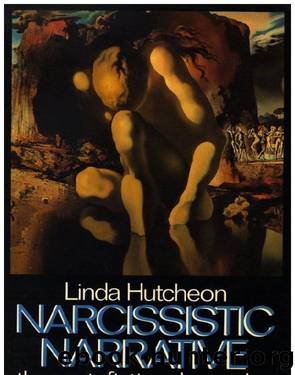Narcissistic Narrative by Linda Hutcheon

Author:Linda Hutcheon
Language: eng
Format: epub
Tags: ebook, book
Publisher: Wilfrid Laurier University Press
Published: 2010-09-05T16:00:00+00:00
CHAPTER SIX
The Language of Fiction: Creating the Heterocosm of Fictive Referents
These people aren’t real. I’m making them up as I go along, any section that threatens to flesh them out, or make them “walk off the page,” will be excised. They should, rather, walk into the page, and break up, disappear.
Gilbert Sorrentino
The theoretical implications of modern metafiction reach out in several significant directions, and many questions come to mind. If literary critical notions of novelistic mimesis must be expanded to include that creative and “vital” process shared by writer and reader, then what subsequent effect will this expansion have on the critical view of the nature of literary language and of the fictional, autonomous identity of the narrated world? If, as recent structuralist theories have suggested, language constructs and directs our world and the limits of what we can conceive and communicate, then can there be such a creature as a transparent linguistic text in the traditional realistic mode? Or does metafiction teach that a text can exist only as language and can function only insofar as it mediates linguistically between writer and reader?
Of all the literary genres, the novel is the one which has perhaps most resisted being “rescued” from the myth of the instrumentality of language. Poetry escaped with the aid of the Symbolists, the New Critics, and others, but the critical fate of the novel has been less open. Part of the problem is no doubt the result of the extended length of the genre. New Critical methods are not totally successful with larger verbal structures, partly because of memory limitations. Since a novel is never a coherent spatio-temporal unit in the reader’s mind, as a lyric poem might be, the critic, in discussing its language, must decide whether he will isolate passages for commentary, trace linguistic threads through the work, or use some other method.1 Metafiction often resolves this dilemma in part for the critic by bringing the formal language issue into the foreground, into the thematized content itself.
Whereas poetic language is now more or less accepted as autonomous and intransitive, fiction and narrative still suggest a transitive and referential use of words. This is no doubt in part due to the fact that the novel is written in prose, and prose is usually considered a discursive medium for ideas. It is also associated with ways of verifying facts, since it often records or describes actual events. However, this superficial explanation alone does not suffice to account for the intransigent belief of many critics 2 and readers that the referents of fictional language are real, that is, that they are of necessity part of the empirical world, as if there actually were a stable and objective reality “out there.” As a reader begins a novel, he does indeed read referentially in that he refers words to his linguistic and experiential knowledge; gradually, however, these words take on a unity of reference and create a self-contained universe that is its own validity (anti “truth”). The fictions and
Download
This site does not store any files on its server. We only index and link to content provided by other sites. Please contact the content providers to delete copyright contents if any and email us, we'll remove relevant links or contents immediately.
| Booksellers & Bookselling | General |
| History of Books |
4 3 2 1: A Novel by Paul Auster(11074)
The handmaid's tale by Margaret Atwood(6874)
Giovanni's Room by James Baldwin(5896)
Big Magic: Creative Living Beyond Fear by Elizabeth Gilbert(4734)
Asking the Right Questions: A Guide to Critical Thinking by M. Neil Browne & Stuart M. Keeley(4599)
On Writing A Memoir of the Craft by Stephen King(4221)
Ego Is the Enemy by Ryan Holiday(4002)
Ken Follett - World without end by Ken Follett(3983)
The Body: A Guide for Occupants by Bill Bryson(3816)
Bluets by Maggie Nelson(3723)
Adulting by Kelly Williams Brown(3681)
Guilty Pleasures by Laurell K Hamilton(3600)
Eat That Frog! by Brian Tracy(3526)
White Noise - A Novel by Don DeLillo(3443)
The Poetry of Pablo Neruda by Pablo Neruda(3371)
Alive: The Story of the Andes Survivors by Piers Paul Read(3320)
The Bookshop by Penelope Fitzgerald(3237)
The Book of Joy by Dalai Lama(3236)
Fingerprints of the Gods by Graham Hancock(3223)
